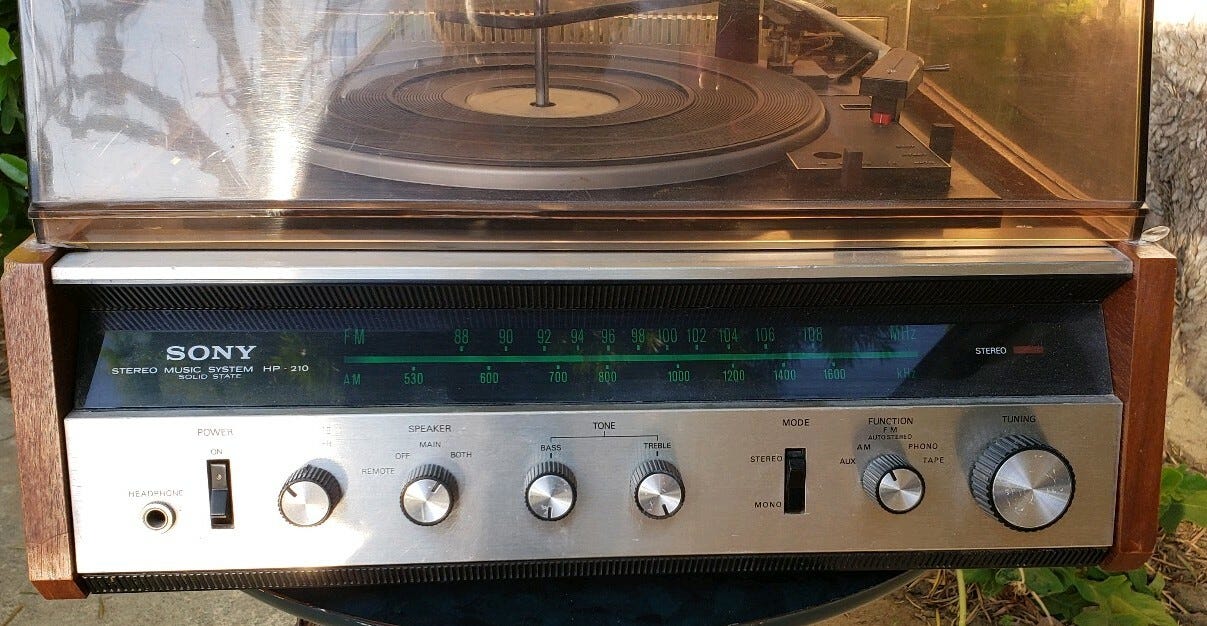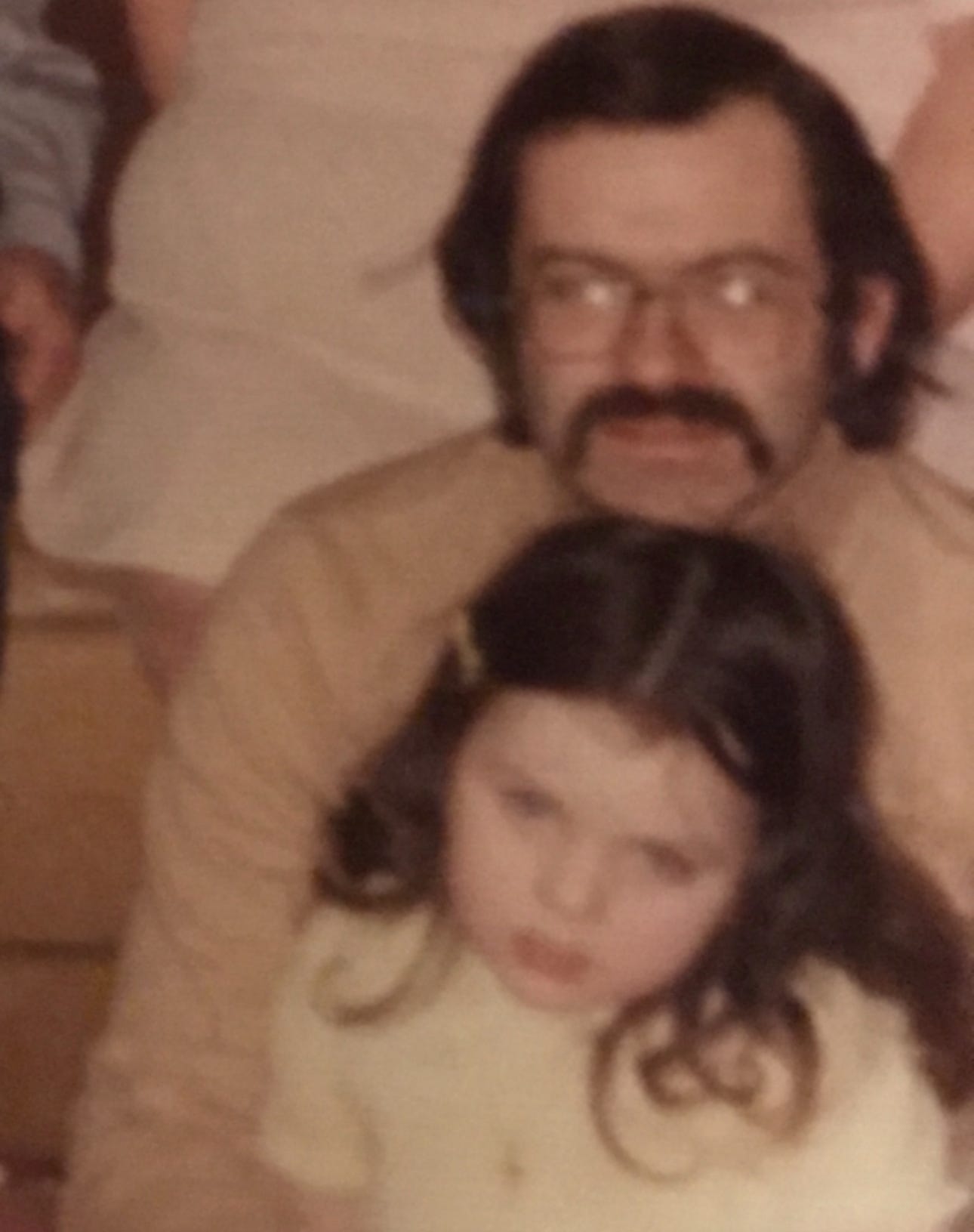There’s an album that, for me, serves as an express ticket back to the earliest years of my seventies outerborough childhood; to the first-floor apartment of a two-family house on a numbered street in Glendale, Queens; to a rust-colored carpet given to us second-hand by my paternal grandparents, its raspy synthetic fibers and faint off-gassing odor still so familiar to my fiftysomething senses; to a Sony stereo with a brushed nickel control panel, neon-green display light and a set of humming walnut bookshelf speakers that mesmerized and comforted little me in the midst of so many big, burgeoning feelings.
Simon & Garfunkel’s “Bridge Over Troubled Water” is forever stitched with those years — and with my father, a Brooklyn born-and-raised Irish Catholic who served as an altar boy at his Flatbush parish, then smoked cigarettes in the alley between the church and his grammar school, after he’d hung his cassock in the rectory closet.
He was the son of a son of a son of a son of the perpetual New York City working-class, possessing the DNA of subway sandhogs, Brooklyn beat cops and utility workers with badges who knew the ins and outs of things, who lifted refrigerators on their backs with canvas straps wrapped around their clenched fists and kept bottles of turpentine on workbenches in cool, dark basements, and who threw back their heads and gulped cold beer in scorching cemented backyards on their days off. Even though those generations of dead-yet-somehow-still-bitter men surely rolled in their graves and resented their progeny’s full ride to a Jesuit four-year college, their eyes — stitched shut by thick-fingered undertakers — still drew touched tears somewhere in their tortured afterlife. One of them had finally made it. One of them had finally gotten out.
After his commute from his midtown Manhattan job, or his Sunday afternoon shift at Xanadu — the dive bar in Edgewater, New Jersey that a couple of his college buddies bought and ran into the ground a few years later — my father would enlist my three year-old help in pouring him a glass of whiskey, three fingers neat. In my mid-twenties, when I ordered the same drink in a West Village watering hole, the bartender seemed surprised. I was small, pale and plain, barely able to reach the barstool, ordering a drink meant for gruff, tired men. But he wasn’t from New York, and he wasn’t Irish. So he didn’t know.
As my parents’ lace-curtain Irish aspirations bristled against the truth of their young and scrabbling, volatile, paycheck-to-paycheck marriage, my father would remove the vinyl disk from the cardboard sleeve printed with photographs of a tall, curly-haired man (Art) and a short, dark-haired one (Paul). He’d switch on the receiver and drop the needle at the outermost groove of the album, and I’d watch the display glow as electricity surged through its wires, taking on a vibrant chartreuse hue. Then he’d light a cigarette, rest his glass on our hand-me-down coffee table, built by someone’s Irish Riviera-born uncle from the remains of a shipwreck near the Rockaways, and take off his dress loafers. My father never wore sneakers unless he was working somewhere in the house, sanding window sills or stripping wood furniture out in the garage. He never wore white athletic socks, either. Gold Toe black dress socks were the only kind he had, rolled into pairs by my mother and tucked into his top drawer. Then he’d flip through the paper or read a Herman Wouk novel, sealing himself into a literary bubble of silence. I knew not to ask questions or interrupt, and I’d lie still on the floor so I could be near him, inhaling the pungent Marlboro smoke that meant Daddy ever since my life began, taking in the Eau de Sauvage-scented mystery of my angry, quiet, scotch-breathed father. Sometimes, I’d lie down right near one of the stereo’s wooden speakers covered in mesh fabric. I’d place my nose up against the synthetic material, squinting one eye to searching for the woofer and tweeter hidden inside, desperate to see something hidden behind the veil.
Then the music would play, track after track, until my father silently rose to lift the stereo dust cover and flip the album to the second side, then set the diamond needle down once more and return to his reading or his bottle of whisky. There was Art Garfunkel’s impassioned tenor voice comingling with a crescendo of violin strings at the close of the album’s title track, “Bridge Over Troubled Water,” the jangling chords of a charango and the flutter of Peruvian flutes on El Condor Pasa (If I Could), sad and happy all at once, tugging at my chest for reasons I didn’t yet have words for. I’d thump the toe of my Buster Brown oxfords on the floor to the handclapping in “Cecilia,” until my father hissed at me to stop, for fearing of making the needle jump and scratch the vinyl.
One of my favorites was “Keep the Customer Satisfied,” a bouncy, upbeat song that culminated in a crescendo of bright, bold horns. As much as I loved the way my body and brain felt when the song played, I delighted in following along with the lyrics even more. I was an early reader, and my small pupils widened as I saw words like slandered libeled Bible crowded together in stark black print on the inside of the gatefold cover. I was putting things together, making connections, anticipating the sounds of vowels and consonants as Art and Paul sang through the box to me. I even liked reading the copyright info printed on the back cover. The album was made in 1970. Like me, I’d think to myself. I was made in 1970, too.
My father usually wouldn’t listen to the entirety of the last track on the first side of the album — “So Long, Frank Lloyd Wright” — but would place the needle on the opening notes of “The Boxer” on Side Two. The song transfixed me, a story of sadness and disappointment. As Paul sang atop the acoustic arpeggio chords, the words strangers and scared peered out at me from the liner notes, and poorer and ragged and lonesome called out to me, too. I didn’t know what a pocketful of mumbles was, but in my head I saw them as glass marbles, just like the ones my father would give me a few years later, after his father died and his mother asked him to take some of his things from their house on Farragut Road. This one’s called a tiger’s-eye, he told me as he held each one up to the light for me to see, and this one is blue like your eyes.
At some point, my mother would call us for dinner, or it would be my bedtime, and the stereo’s chartreuse display would darken again.
My father was impossible to know or reach, and he preferred it that way. The last time I saw my father, we argued at my kitchen table. He berated me, as he always did, for my many imperfections, and never balanced them with kindness. Why hadn’t I displayed a framed picture of his new wife in my home? Why wasn’t I the daughter — or more accurately, son — he wanted? Why wasn’t I someone else entirely? On that day, in my mid-forties, I finally found the words, which arose in my mind’s eye in stark black print, words like drunk and neglect and cruelty. I chastised him for being so cold and aloof during my childhood, for giving more of himself to booze and football and Basil Rathbone films on Saturday afternoons than to me, for choosing other women over my mother while he still wore his wedding band, for coming home late or occasionally not at all, smelling of woolen-suit-sweat and aftershave and the nearness of other people in midtown bars, for waking me repeatedly in the middle of the night to impart booze-fueled advice about career choices and card games and moral leanings, for ever being my father at all.
We haven’t spoken in nearly a decade. I doubt we ever will again.
Bridge Over Troubled Water is a musical masterpiece, timeless in its themes of perseverance and strength, swelling with emotional impact and tenderness, melodic and multi-genred and lyrical, innovative and resonant. It’s one of the only albums I’ll listen to from start to finish without tiring of its strains. Sometimes, I sing the lyrics too loudly while I drive an open-windowed car on a warm summer day, or chop vegetables alone in my kitchen. Sometimes, I cry while I do. Sometimes, I don’t feel anything at all.
I wonder if my father thinks of me when one of those songs plays on the radio, or if he still owns the album, after so many reincarnations of stereo equipment. I wonder if he remembers me there at all, sprawled on the floor in my maroon bell-bottom corduroys and tangled brown hair comically held off my face with a plastic Goody barrette, so desperate to be seen and known, so desperate to be told that I was wanted and not a mistake or a regret— even though my three year-old heart already knew the answer.
Here is my song for the asking
Ask me and I will play
So sweetly, I'll make you smile
This is my tune for the taking
Take it, don't turn away
I've been waiting all my life
Thinking it over, I've been sad
Thinking it over, I'd be more than glad
To change my ways for the asking
Ask me and I will play
All the love that I hold inside






I’m a decade older than you, and I was entirely happy to ( and actually allowed to ) release the very same disc from its covers and put it onto my father’s beloved stereo system. Gently moving down the lever that controlled the arm of the record player into the outside groove without bumping it down and crashing the entry point on the vinyl.
I feel like every beat and word is woven into my being from that LP. I saw the lyrics and out of nowhere I was singing that song, and I haven’t heard the album for quite some time now. Utterly evocative piece of writing, thank you.
Really enjoyed this though the ending was heartbreaking. It brought back memories of listening to music with my hippie parents on the brown console stereo. We talk occasionally but there is enough tension I can appreciate your ending.